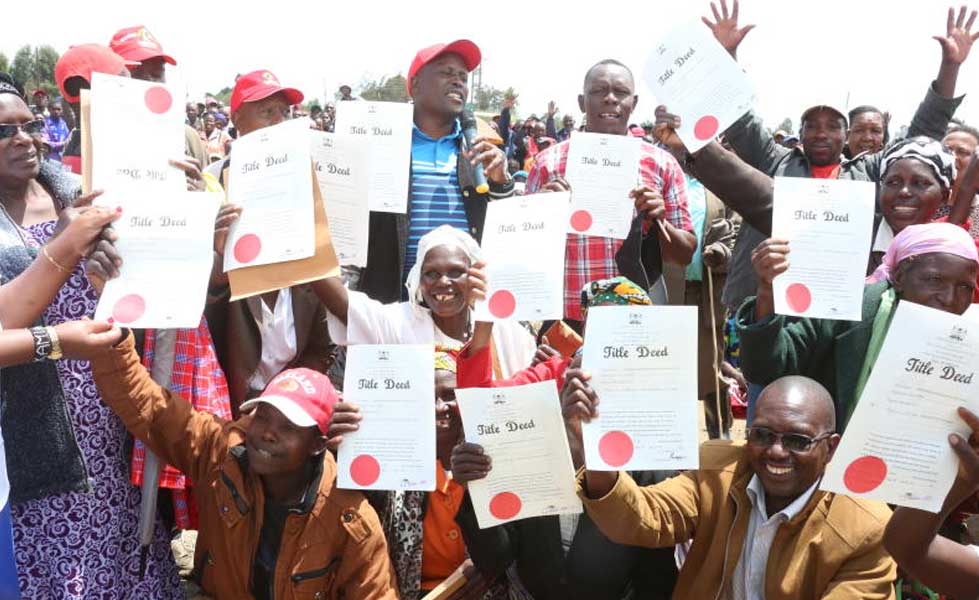Issues Arising and Analysis of The Issues
- What is Conversion of Titles?
- What is the applicable Law?
- What will be the process of converting the titles?
- What are the requirements for Conversion of the Land Titles?
- How will Conversion affect land Ownership?
- How will Conversion affect interests of Banking/financial institutions as well as other interest holders, say in case of existing registered leasehold interests?
- Are there any anticipated Challenges?
What is Conversion of land Titles?
This is a process of registration of current title numbers for various parcels of land under new registration units which shall result in replacement of the old title numbers with new title numbers. This process will require the development of cadastral maps and the conversion list by the Survey of Kenya.
The conversion list shall indicate the new and the old numbers for parcels of land within a registration unit or block. This process will involve a land owner surrendering their old title to the government through the Ministry of Lands. The Cadastral map which generally refers to the Registry Index Map and the survey plans, shall replace the Deep Plans used to process titles in some of the old land law regimes.
Currently, the conversion process that has been kicked off, will only affect certain parcels of land within Nairobi County before the exercise is rolled out to the rest of the Country.
What are the applicable Laws?
Article 68 of the Constitution of Kenya, 2010 is the main guiding legislation on conversion since it calls for consolidation of the various land registration regimes which were operational before the enactment of the Land Registration Act, 2012 and the Lands Act, 2012. These repealed statutes include The Indian Transfer of Property Act,1882, the Government Lands Act (Cap 280), the Registration of Titles Act (Cap 281), the Land Titles Act (Cap 282) and the Registered Land Act (Cap 300).
Therefore, the sole purpose of the conversion is to bring all lands within the Republic of Kenya under one regime.
Section 6 of the Act, provides for the establishment of Registration Units by the Cabinet Secretary. The Cabinet Secretary in exercise of the powers conferred under this Section, vide Legal Notice no. 277 of 2017, issued the Regulations. In the said Regulations the Cabinet Secretary established a total number of 61 registration units to facilitate in the conversion process and also increased the number of land registries from 21 registries to 61 land registries.
Pursuant to Gazette Notice No. 11348 dated 31st December, 2020, the Cabinet Secretary issued a Notification of Conversion in respect of certain land reference numbers already converted within the Nairobi Land Registration Unit.
What are the applicable Laws?
Article 68 of the Constitution of Kenya, 2010 is the main guiding legislation on conversion since it calls for consolidation of the various land registration regimes which were operational before the enactment of the Land Registration Act, 2012 and the Lands Act, 2012. These repealed statutes include The Indian Transfer of Property Act,1882, the Government Lands Act (Cap 280), the Registration of Titles Act (Cap 281), the Land Titles Act (Cap 282) and the Registered Land Act (Cap 300).
Therefore, the sole purpose of the conversion is to bring all lands within the Republic of Kenya under one regime.
Section 6 of the Act, provides for the establishment of Registration Units by the Cabinet Secretary. The Cabinet Secretary in exercise of the powers conferred under this Section, vide Legal Notice no. 277 of 2017, issued the Regulations. In the said Regulations the Cabinet Secretary established a total number of 61 registration units to facilitate in the conversion process and also increased the number of land registries from 21 registries to 61 land registries.
Pursuant to Gazette Notice No. 11348 dated 31st December, 2020, the Cabinet Secretary issued a Notification of Conversion in respect of certain land reference numbers already converted within the Nairobi Land Registration Unit.
What will be the process of converting the titles?
The conversion process is outlined under section 6 of the Act and in regulations 4 to 9 of the Regulations.
Constitution of the Land Registration Units
Under section 6 of the Act the Cabinet Secretary has the mandate to constitute the Registration units which she has done by constituting a total number of 61 registration unit in the First schedule of the Order.
Division of the Registration Units
The Registration Units shall then be divided into Registration Sections identified by a distinctive name and may further be divided into blocks which shall then be given distinctive numbers or letters or a combination of both. This is to assist in the allocation of new numbers that shall replace the old land reference numbers.
Development of Cadastral maps and Conversion List
This is to be done by the Survey of Kenya which has already commenced and have so far produced cadastral maps for 23 blocks out of the total 141 blocks in Nairobi. As explained above, the Cadastral maps refer to both the survey plans and registry index maps. The registry index maps are generated from already existing survey plans.
Invitation of the registered Land owners to replace their titles
Upon development of the Cadastral maps and the conversion list, the Cabinet Secretary shall within 30 days of receipt of the cadastral maps and the conversion list from the Registrar publish a notice in at least two newspapers of nationwide circulation and announce in radio stations of nationwide coverage inviting the registered land owners to make an application for the replacement of their titles.
Invitation to file complaints
The Cabinet Secretary issued a directive on procedures for handling complaints, though the same did not give clear timeframes on tracking progress and/or conclusion of the conversion process. However, the Ministry has set up a complaints/customer care help desk at its headquarters at Ardhi House Nairobi as well as an FAQ section in the Ministry’s website under the FAQ’s tab, https://lands.go.ke/faqs/.
Complainants are to submit a standard form known as Form LRA 96 set out under the Regulations and annex the following:
- Copy of title;
- Copy of Identification documents and personal identification number (PIN); and
- Contact address and telephone number.
Persons eligible to lodge a complaint include land owners who fear that their plot numbers may have been erroneously left out of the conversion list or in instances where parcel numbers have been wrongly stated.
Requirements for Conversion of the Land Titles.
Every registered land owner shall be required to submit the following documents to facilitate the process of conversion:
- Application form for conversion by way of a standard form (Form LRA 97);
- Original Title document of the property;
- Certified copies of the land owner’s Identity documents; and
- If the title is registered under a registered company, a certified copy of the Certificate of incorporation or registration as well as its director’s or official copies of Identification documents.
Upon submission of the above documents the Registrar shall then issue a new title and retain the old one.
Currently titles are processed using a deed plans or registry index maps depending on the regime the property is registered under. The deed plan captures information limited to the parcel in question but not on adjacent properties as in the case of a registry index map. Where some properties might be left out in the cadastral map and the conversion list, the affected land owners will be required to register a complaint with the registrar who is required by the order to respond to such complaint within a period of 90 days.
How will Conversion affect land Ownership or third party interest?
Conversion will ease land management and bring efficiency in land transactions which is expected to curb the many cases of fraud, corruption and delays in processing of land ownership documents.
How will Conversion affect interests of Banking/financial institutions as well as other interest holders, say in case of existing registered leasehold interests?
-
Due diligence for new lending
Banks and other financial institutions should streamline their due diligence processes to ensure that even as they lend, they cross check any properties availed as security with the communicated conversion list to ensure that proper steps are taken in dealing with affected properties while undertaking the loan approval processes. They should cross check all the land titles with the cadastral map and the conversion list.
-
Legal audit for existing loans
Financial institutions should also note to undertake legal audit exercises to identify which of their securities are registered against affected properties. Doing this early enough will allow for them to facilitate the conversion process by the land owners to secure their interest in any charged property and regularize their securities.
The information in the old register shall be transferred to the new register and new title meaning that the interest of the financial institution will be automatically registered in the new register and the new title shall be released directly to the institution.
Other interest holders such as lessees with registered leases should also carry out an audit to confirm whether the properties they hold leases under have been listed in the existing and subsequent conversion notices. If so, then such registered leases will need to be surrendered and registered concurrently with the replacement leases.
-
Due diligence for new lending
Banks and other financial institutions should streamline their due diligence processes to ensure that even as they lend, they cross check any properties availed as security with the communicated conversion list to ensure that proper steps are taken in dealing with affected properties while undertaking the loan approval processes. They should cross check all the land titles with the cadastral map and the conversion list.
Are there any anticipated Challenges?
- Since it is a transitional process, the practicality of the process really needs to be taken to great consideration in light of ongoing digitization processes which has already led to a lot of delays in conclusion of transactions due to unavailability of files without a clear end date. To this end, the Ministry needs to be very clear on time frames of conclusion of the conversions and processing of the new titles where applications are received as the information shared so far does not capture this.
- The process creates a back log of various transactions given that the same is to be conducted concurrently with the digitization process which has currently almost halted the daily formalities of the registry.
- There may be numerous complaints as a result of the conversion and land owners need to be properly sensitized on the conversion process clearly to avoid panic.
- Challenges may also arise where affected properties also have third party interests registered thereon. These could be court orders, cautions/caveats that need to be withdrawn, bank securities, or long term leases for commercial or residential spaces. Any conversion would need all third parties to give their consent for surrender of the affected titles to facilitate issuance of new ones and to have their interests entered in the new titles.
- Some rights such as existing court orders, cautions and restrictions existing in land registers will need to be balanced on the land owner’s title, that is, the register and the land owners title should reflect each other. While this balancing of entries will cause a delay in the conversion process, some land owners who may not be aware of the existence of such encumbrances will are likely to raise objections hence further delays.
- Some land owners may have passed on and the succession process may not have been undertaken. This may pave way for fraud should it come to the attention of adverse claimants.
- Some land owners are in the process of change of user, extension of lease, amalgamation among other property developments. This will need a properly outlined mechanism of handling such land titles and this will also have a time implication.
- It is not clear what the cost implication will be for the landowners to carry out the conversion, but it is clear that where properties are subject to third party interests, there will inevitably be some form of cost implication to be anticipated. Those with land rent arrears will definitely need to be cleared before the conversion can be undertaken. This is another financial implication for those with arrears.
- It is also not clear if the conversion will lead to a re-assessment of land rent or rates payable against a property. This may be a possibility.
- Existence of formal government application booking charges, even though nominal, towards the application for title surrender and new title issuance process has not been communicated but should be anticipated.
Conclusion
The pronouncement on conversion of titles has undoubtedly caused panic among land owners but we believe the Government is committed to the success of this process as evidenced by the creation of additional land registration units and help desks to enable commencement of conversion processes. We trust that where property is genuinely owned, there will be no threat of loss of ownership or any registered interest or change of tenure of the property and all that the land owners need to do is adhere to the Government’s call for conversion of the titles as this is aimed at securing their interest and ease any future transactions on the properties.
- Land owners will be allowed to make the application for conversion simultaneously with any other dealings they are undertaking on the property that may include:- transactions directly affecting land tenure or usage, transfer of interest or registration of third party interest. Such simultaneous execution may help to reduce delays.
- The process is transitional and therefore we trust that any pending or ongoing transactions will continue despite the formalities of the conversion process.
- This is indeed a new creature of sorts for the legal profession as well, since charges for these kind of work are not defined under the Advocates Remuneration order. This remains to be a test of the waters to be preceded by thorough due diligence to establish title authenticity and existence of third party interests, and subsequently guided by the challenges or hurdles that may arise at a case by case basis hence dictating the time to be consumed to conclude each title exercise, being that the Ministry of Lands itself is yet to advise on clear time frames for conclusion of each exercise.





